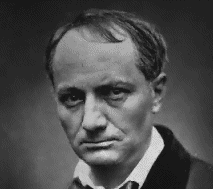
(1821-1867)

(1821-1867)
| French poet and
critic, a leader of the symbolist school. Baudelaire was born in Paris on April 9, 1821, and educated at the Collège Louis-le-Grand. His boyhood and adolescence were unhappy, for his father died when he was six years old, and he disliked his stepfather and resented his mother for having married him. Opposed to his choice of a literary career and hoping to distract him, his parents sent him on a sea voyage to India in 1841. He left the ship, however, and returned to Paris in 1842 more determined than ever to devote himself to writing. In an effort to solve his financial problems he began to write critical journalism. His first important publications were two booklets of art criticism, Les Salons (1845-1846), in which he discussed with acute insight the paintings and drawings of such contemporary French artists as Honoré Daumier, Édouard Manet, and Eugène Delacroix. |
 |
| He was first
acclaimed as a skilled literary craftsman in 1852, when
his translations of the work of the American writer Edgar
Allan Poe began to appear. Encouraged by that success and
inspired by his enthusiasm for Poe, with whom he felt a
strong affinity, Baudelaire continued to translate Poe's
stories until 1857.In 1842 he reached his majority and
inherited the legacy bequeathed by his father, and left
home to enjoy a life of luxury. The large amounts of
money he spent on his flat at the Hôtel Lauzun and his
decadent lifestyle earned him a reputation for
eccentricity, affectation, and immorality, as well as
huge debts that were to cripple him for the rest of his
life. During this period of freedom and leisure, however,
Baudelaire was extremely creative, writing many of his
most celebrated poems. Baudelaire's major work, the volume of poetry Les Fleurs du Mal (Flowers of Evil), appeared in 1857. Immediately after its publication the French government prosecuted Baudelaire on a charge of offending public morals. Although the elite of French literature came to his support, he was fined, and six poems in the volume were suppressed in subsequent editions. The ban was lifted only in 1949. His next work, Les Paradis Artificiels (1860), is a self-analytical book, based on his own experiences and inspired by the Thomas De Quincey memoir Confessions of an English Opium Eater. From 1864 to 1866 Baudelaire lived in Belgium. In June 1866, stricken by paralysis brought on by a venereal disease, he was brought back to Paris, where he died on August 31, 1867. Now considered one of the great poets of French literature, Baudelaire possessed a Classical sense of form, great skill at choosing the perfectly appropriate word, and a true gift for musical language; he produced some of the most mordant but beautiful verse in the French language. His originality, which shocked and disturbed, sets him apart from the dominant literary schools of his time. His poetry has been variously regarded as the last brilliant summation of Romanticism, the precursor of Symbolism, and the first expression of modern techniques. He viewed an individual as a divided being, drawn equally towards God and Satan; his poems deal with the timeless conflict between the sensual and the ideal, between spleen and idéal. They depict all human experiences, from the most sublime to the most sordid. Among his other writings are Petits Poèmes en Prose, a collection of prose poems, and his intimate journals, Fusées (Fireworks) and Mon Coeur Mis à Nu (My Heart Laid Bare). All were posthumously published in 1869. |
Aleister Crowley - Anne Rice - Anton Szandor LaVey - Arthur Schopenhauer - Charles Baudelaire - Charles Darwin - Edgar Allan Poe - Friedrich Nietzsche - Howard Phillips Lovecraft - J.R.R. Tolkien - Karl Marx - Lord Byron - Marquis de Sade - Mary Shelley - Sigmund Freud - Stephen King